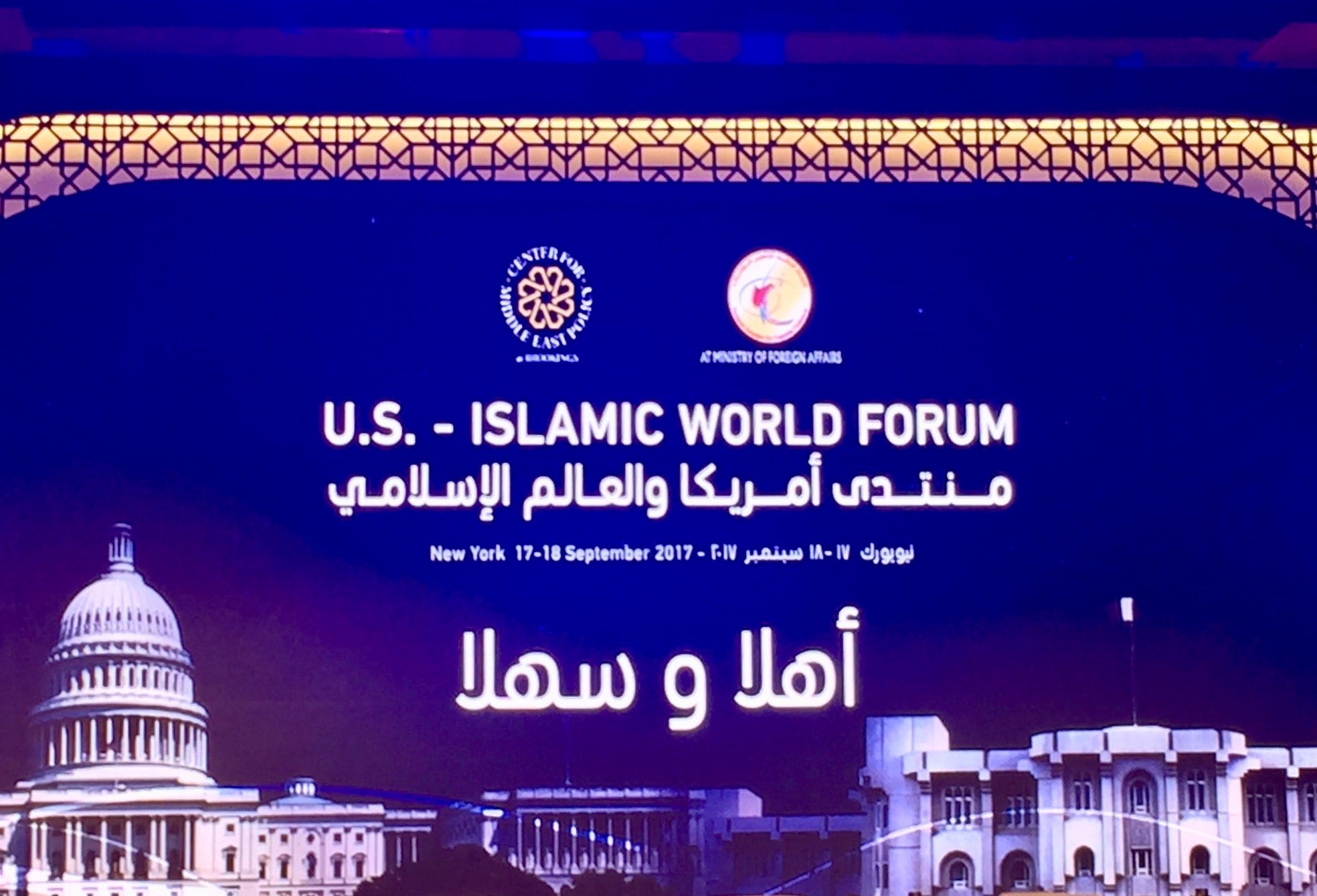
Image Credit: Marcia Wong (@marciakimwong). Image originally accessed at https://twitter.com/marciakimwong/status/909396594117742592.
Highlights from 2017 Brookings US-Islamic World Forum
As the city of New York prepared to host the 193-member United Nations convening of the 2017 UN General Assembly, the Big Apple was also hosting hundreds of international participants for the 13th annual 2017 US-Islamic World Forum co-sponsored by the Brookings Institution and the Gulf state of Qatar.
The theme for this year’s 2017 US-Islamic World Forum was “Crisis & Cooperation” and it brought together several hundred participants from around the world to discuss issues related to the future of refugees, religious pluralism and international cooperation related to diverse Muslim communities around the world.
From a packed ballroom at The Conrad Hotel only a few blocks from The World Trade Center complex, Brookings executive vice president Martin Indyk welcomed this year’s participants by noting that the US-Islamic World Forum was conceived over 15 years ago in the wake of horrendous terrorist attacks of 9/11 to help better understand dynamics between the United States and greater Islamic world.
The morning keynote address from Qatari Foreign Minister Mohammed bin Abdulrahman Al Thani highlighted his country’s goals of “deepening relations” based on “mutual respect” in the age of growing religious bigotry around the world.
One of the most-discussed plenary sessions was entitled “The Future of Pluralism, Citizenship & Religion in the Middle East” which discussed topics related to Islam, democracy and religious freedom today. The four panelists for this plenary session included prominent Turkish journalist (& New York Times contributor) Mustafa Akyol and Egyptian satirist Bassem Youssef. In a spirited (borderline heated) discussion, the four panelists in this first session debated the role of religious freedom in modern societies today.
“We Muslims in America have a lower approval rating than Donald Trump,” began Egyptian comedian Bassem Youssef during his plenary remarks. Mustafa Akyol noted during his opening remarks that France is “not respectful” of its female Muslim citizens who freely choose to wear the hijab (or wear a “burkini‘ on the beach) and that comparatively, the United States is quite a better model for religious tolerance than some of our European counterparts.
Another well-attended plenary session revolved around “Refugees and Cities” inviting several prominent European mayors to discuss how their cities were successfully integrating refugees into their societies. In addition to mayors (or deputy mayors) from cities like Athens, Bristol and Stockholm, former UN Deputy High Commissioner for Refugees Alex Aleinikoff opened the session reminding the audience that “only 25% of the world’s refugees live in refugee camps” and that most global refugees actually reside in major international cities which makes it challenging for refugee advocates to ensure proper integration on a variety of levels.
For instance, the deputy mayor of Athens, Greece noted during this refugee plenary session that his metropolitan city transformed from a “transit city” for refugees to a “destination city” in just a few years’ time. The vice mayor of Stockholm noted that her largest city in Sweden had to react “very, very quickly” to a large influx of “mostly young men from Afghanistan” to ensure that the city could provide them with adequate housing after fleeing their war-torn nation. The mayor of Bristol in the United Kingdom highlighted how the Brexit vote had an adverse impact on minorities and refugees writ large in his city as well. Finally, the state secretary of Hamburg, Germany proudly mentioned that nearly 35% of Hamburg residents come from a “non-German” background and highlighted the success of his city in integrating refugees from many parts of the world.
The final plenary session for the 2017 Brookings US-Islamic World Forum revolved around counterterrorism isssues. Moderated by New York Times senior correspondent Eric Schmitt, the four panelists discussed how groups like ISIS have used internet technology to further their aims, debated the “profile” of potential recruits and pondered the role that civil society can play in mitigating the impact of extremist groups in their respective societies.
Retired Marine four-star general (and Obama special envoy) John Allen began the final plenary session by noting that groups like ISIS (or “Daesh’ as he interchangeably referred to them) had “mastered capacities in technology” not seen before from groups like Al-Qaeda. Genera Allen further emphasized that ISIS is “not the true narrative of Islam” and that extremist groups would win if Western societies infringed on the rights of their diverse Muslim populations by chipping away at the gray zones of coexistence.
Although the panelists generally agreed that there was not an exact profile for potential recruits for extremist groups, most of the panelists did note that recruits tend to exhibit some levels of sociopolitical disenfranchisement, like an ISIS commander who told an ABC News producer that French fighters of Moroccan descent traveled to Syria because “they didn’t feel at home” in France because of their perceived second-class citizenry. The panelists also highlighted other forms of terrorism, including the rise of neo-Nazi fascist terrorism in Charlottesville or Anders Breivik in Norway. Finally, they concurred that grassroots Muslim communities and religious leaders are the most authentic voices to combat the meta-narratives of groups like ISIS by using the robust soft power of civil society to help strengthen Muslim communities around the world.
As Donald Trump prepares to address his first United Nations General Assembly, many of the 193 member states of the UN will be wondering how he is going to treat disenfranchised minorities like Muslims moving forward. By bringing prominent global leaders from government, media and civil society together for the 2017 Brookings US-Islamic World Forum in New York City, we were able to continue many important discussions related to the future of Muslims all around the world.
Arsalan Iftikhar is a Senior Research Fellow at the Bridge Initiative.

 Search
Search